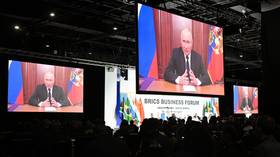Young diplomats discuss multipolarity in Kazan, Russia
Some 130 guests from 40 countries attended the event in the capital city of the Republic of Tatarstan, organizers say
The 6th Global Forum of Young Diplomats has concluded in the Russian city of Kazan, where participants signed a joint document stressing the importance of advancing efforts to build a fair, polycentric world.
The event, which took place in the capital of Russia’s Republic of Tatarstan between August 17 and 21, was attended by some 130 diplomats from the 40 nations of the former Soviet Union, Asia, Africa and Latin America, the organizers said in a statement on Wednesday. The guests included ambassadors and foreign ministry representatives.
The forum was organized by the Council of Young Diplomats of the Russian Foreign Ministry, with the assistance of Tatarstan’s Youth Ministry, the Academy of Youth Diplomacy NGO, and the Alexander Gorchakov Public Diplomacy Fund. The theme of this year’s gathering was “Diplomacy in a New Multipolar World.”
Guests were addressed by high-ranking Russian officials, including Foreign Minister Sergey Lavrov and Sports Minister Oleg Matytsin.
Lavrov pointed out that “the emergence of a polycentric world order is a lengthy process related primarily to the democratization of interstate relations, which should be based on the universally recognized norms of international law and take into account the civilizational diversity of the world.”
Moscow is ready for “close interaction” with all countries that share its “values of equality, mutual respect, and non-interference in internal affairs of others,” he said.
During the forum, several major discussions took place, addressing issues including information security in modern international relations, and the use of so-called ‘soft power.’
The event concluded with the young diplomats signing a joint document, which underlined the importance of unified efforts towards building a polycentric world based on international law, as well as the need to develop the concept of ‘horizontal diplomacy,’ which is based on contacts between younger, lower-level diplomatic workers from various countries.
The Council of Young Diplomats of the Russian Foreign Ministry was established in 2001. It unites Russian diplomats under the age of 35, working at the main office in Moscow or with the country’s missions abroad. The organization’s goals include improving the professional skills of employees, preserving traditions of the diplomatic service, and corporate spirit. It also facilitates communication between younger staff and the leadership of the ministry.






Comments are closed.